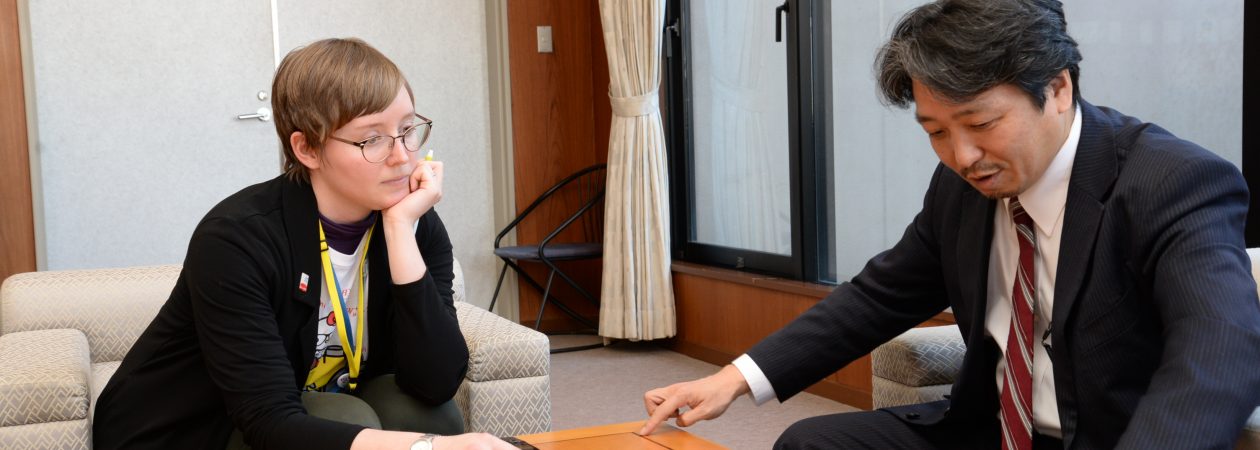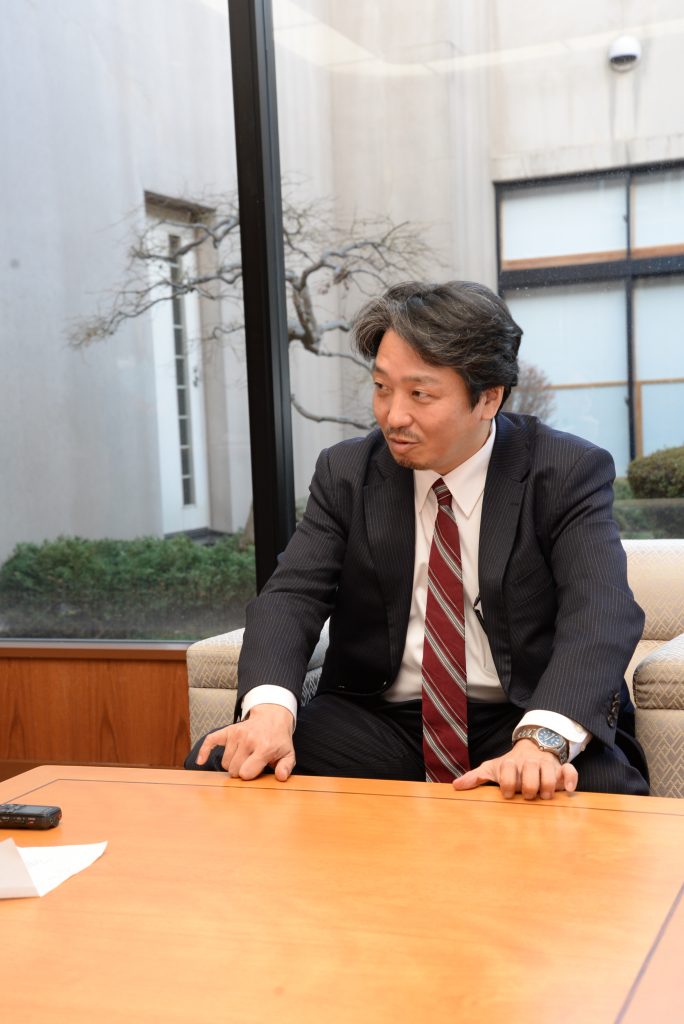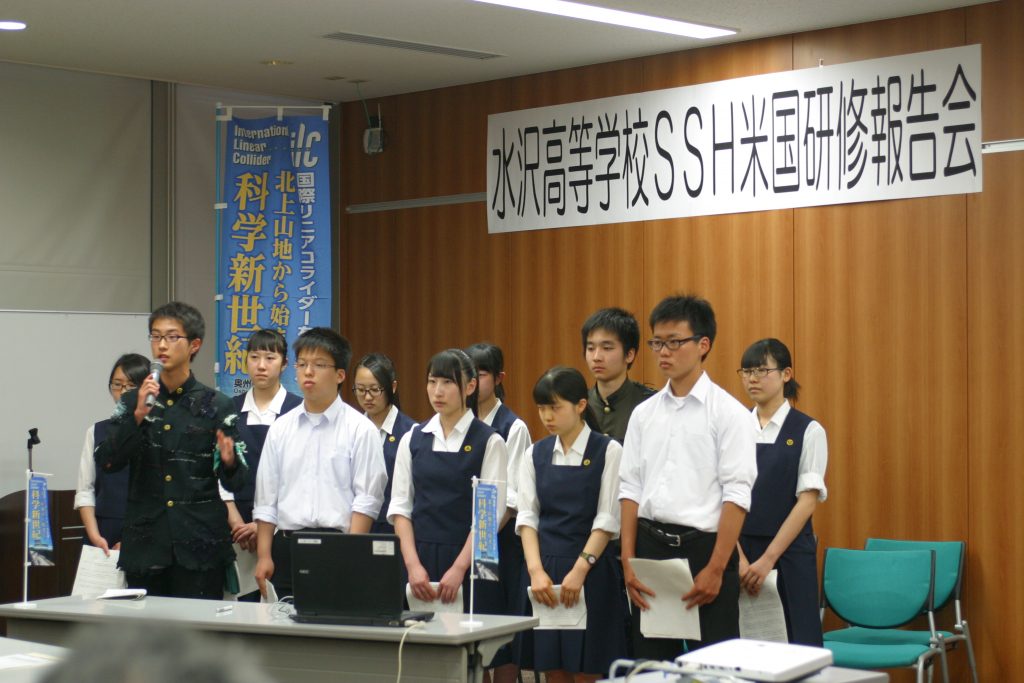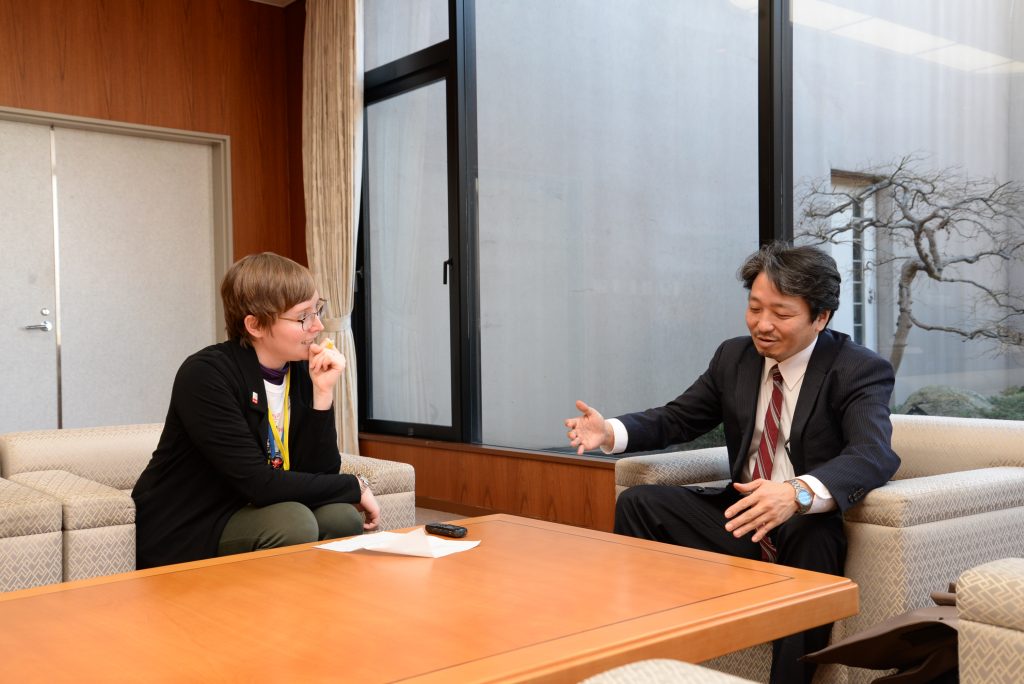Professor Satoru Yamashita (professor at ICEPP, University of Tokyo) a central player both domestically and abroad in the push to invite the ILC, came to Oshu City to give a talk about how important 2017 and 2018 are for the ILC. He was kind enough to answer questions after his talk.
Anna: How do you expect the Tohoku ILC Preparation Office to relate to MEXT’s ILC panel of experts working groups?
Professor Yamashita: Because the Japanese government has not yet officially decided on the ILC site, results from the Tohoku ILC preparation office will be treated as a case study, but like the MEXT ILC panel of experts, it will be a valuable reference for the Japanese government: what sorts of systems look feasible, what sort of problems or issues are there, what cost or policies will it require, and what preparations will increase its likelihood of becoming a reality.
A: We heard in your talk that the Japanese government will decide about the ILC in 2018. Please tell us the general process for what happens after MEXT’s ILC panel of experts working group makes its preliminary conclusions in July this year. After that, what leads to the Japanese government announcing it will invite the ILC?
Y: Before the Japanese government decides “yes” or “no,” there are various conditions to be met. The most important is reducing costs. The next important are the validity of cost vs. anticipated benefits, plans for organization structure and management, risk management for earthquakes and natural and man-made disasters, establishing who will shoulder what costs domestically, how to obtain a budget while making sure other fields aren’t disadvantaged and prospects on shouldering costs internationally. Especially important among these conditions is whether sharing costs internationally looks promising, as the Science Council of Japan and the MEXT panel of experts advised. This international process on costs needs to be advanced at the same time as the MEXT ILC panel of experts continues its activities.
The international planning team, KEK, universities, the Tohoku ILC Preparation Office and AAA are already working on the preparations and solutions needed to meet these conditions that are within the realm of industry, academics and local government. The domestic budget and prospects for sharing costs with other countries are up to the Japanese government: the most important thing is collaboration between the Japanese national government and the Federation of Diet Members for the ILC. On top of that, we need to plug in what local areas and what the private sector can provide. This is why we’re sharing information and preparing with those involved.
If the conditions listed above are met, the MEXT panel of experts will say “yes” to the ILC, and while the conditions still aren’t right, the panel of experts can be expected to continue its role of thoroughly pointing out issues. Meeting these conditions directly links to the Japanese government making its decision. The Japanese government’s process for a decision is: first, the MEXT panel of experts. It’s possible that the government could hear opinions from the Science Council of Japan while the MEXT panel of experts is working. What usually happens next for large scientific projects is there’s a discussion at the Council of Science Technology and Innovation (CSTI) which is held by the Minister of State of Science and Technology Policy and headed by the Prime Minister, and finally the cabinet makes a decision.
A: I heard that the Federation of Diet Members for the ILC will visit the US in the spring. This is the first visit since President Trump was elected. Do you think it’ll be difficult to convince the Trump administration of the importance of the ILC, or of basic science? How do you expect the change in administration to affect the ILC?
Y: For the US budget, the White House makes a proposed budget and congress does the actual assessments and revisions based on that. The Trump administration laid out its general direction recently, proposing to strengthen defense funding and markedly reduce various departments including the State Department. The ILC is under the authority of the Department of Energy: reduced funding for the Department of Energy in some areas was also proposed. Some are worried because of a certain degree of proposed cuts to basic science which covers a wide range of fields, but the key is congress is the one that actually assesses and revises the budget. That’s why I hope the Federation of Diet Members for the ILC will stress the importance of Japan-US relations and science and technology to both the US government and to congress, and pour effort to putting us on a positive course. Also, unlike in the past, both congress and the US president are Republican majority so I think it’s a good thing (for the ILC as well) that things can be decided and then followed through with.
A: This year and next year are important—the “final corner” for the ILC. What advice or hopes do you have for local governments and for ILC researchers who read the Kitakami Times?
Y: First, it’s important to get as many people from as wide an area and wide a range of fields as possible, inside and outside Japan, informed about the ILC project, how it’s progressing, and especially about reducing costs and the importance of the ILC. It’s important to get support from all of Japan. I hope that everyone will pour as much effort into this as possible. I also hope that everyone will be careful not to communicate one-sided stories like “We are doing our best in such and such a way” ”This is the plan we’ve made,” but to tell as many people as possible, throughout the world and from within Japan, “we want to plan this together, so tell us your ideas and share your wisdom with us.”
A: Eleven high school students from Mizusawa High School went to visit SLAC in February. Seven of those eleven students were girls. What kind of efforts do you think are needed so female researchers can have a comfortable working environment?
Y: I think that if instead of focusing on whether someone is male or female, everyone is given responsibilities based on their abilities and enthusiasm society will naturally become a place where female researchers can thrive. In doing so I think it’s important to reduce or curb the way of thinking that privileges seniority, while maintaining respect for older people. I think younger researchers don’t really distinguish between or discriminate based on sex. If the current privilege for older people continues as is, that will tend to perpetuate the previous way of thinking distinguishing between men and women. On the other hand, I think it’s best not to treat women differently because they are women.
These factors are a given in places like CERN. Europe has countries with more female researchers than male, with Italy being the most striking example. I think researchers at the ILC, like at CERN, will be able to work hard together naturally without being conscious of sex. I hope that the ILC model will then spread throughout the country.
We talked about even more in person about things like staging and about Science Kitty. Thank you so much to Dr. Yamashita for taking the time to answer my questions!
Japanese
山下了先生(東京大学素粒物理国際研究センター特任教授)とのインタビューアンナ・トマス
ILCを誘致する上で国内外で中心的な役割を担っている山下了先生(東京大学素粒物理国際研究センター特任教授)が奥州市にお越しになって2017年と2018年がILCにとって重要な年であることについて講演をされました。講演の後、Kitakami Timesのインタビューに対応していただきました。
アンナ: 東北ILC準備室 は有識者会議の部会とどう関わりそうですか?
山下先生: ILCの誘致は国として決定している訳ではないため、東北ILC準備室の成果は
ケーススタディーとしての扱いとなりますが、実現可能な体制がどういったものか、課題はどこにあるか、コストや必要な施策は何か、実現可能性を高める受け入れ準備は何か等、これらの情報は有識者会議はもとより、国として判断するための重要なインプットになります。
A: 講演の中で2018年が決断の年になるとお聞きしました。有識者会議の作業部会が今年7月にとりまとめを行った後の、国の誘致表明までの想定している大まかな流れを教えてください。
Y: 国として是・否の決定よりも前に、コスト削減の話がまず第一。その次が予想される成果とコストの妥当性、組織・マネージメントの方策、地震・災害・人災・コスト増などリスク管理、国内コスト負担の分担と他分野にダメージがないような予算獲得の方策、海外との分担のめど、これらが条件です。この中でも特に、前回の学術会議や有識者会議でも提言されている通り、海外との分担がうまくいきそうかどうかの見極め(めど)があり、これは有識者会議の活動と並行して進められる必要があります。
条件をクリアするための準備・解決策のうち、産・学・地元でできる部分は、国際設計チーム・KEK・大学・東北ILC準備室・先端加速器科学技術推進協議会が連携して既に対応できています。国内予算と海外との分担のめどに関しては、国・政府でないとできない部分となり、政府・議連の連携がまず第一に重要で、さらに地元ができる部分、民間ができる部分をはめ込んでいくことが必要です。このため関係各所との情報共有・準備を進めています。
有識者会議は、上記の環境が整えばGOサインですし、環境が整わない間は課題を指摘する役目に徹すると考えられます。環境が整うということは、すなわち政府として意思を固めることに直結します。国としての決定プロセスは、第一に有識者会議。その間に並行して学術会議から意見を聞く可能性はあります。その次が、大型の科学技術プロジェクトの場合、総理が議長であり内閣府科学技術大臣が開催する総合科学技術イノベーション会議(CSTI)での議論があり、そして閣議決定という流れです。
A: 超党派の国会議員で構成される議員連盟が春に米国を訪問するとお聞きしましたが、 トランプ政権になって初めての訪問です。ILC(基礎科学)の意義をトランプ政権にアピールするのは困難と思いますか? 政権が変わることで、ILCへどのような影響があると思いますか?
Y: 米国の政府予算は、大統領府が基本的提案を行い、それを受けて議会が実際には査定と修正を行うという仕組みです。トランプ大統領の政権からの基本的方向性が先日示されましたが、防衛費を伸ばす一方、国務省などいくつかの省庁が大幅削減を提案されています。ILCを直接管轄するエネルギー省でもいくつかの分野で予算増削減が提案されています。広い分野をカバーする基礎科学(Basic Science)も多少の削減を提案されているため心配する声も上がっていますが、実際は議会が査定・修正するところが一番の鍵です。そのため、日本の議連には日米関係と科学技術の重要性を政府と議会の双方にきちんと訴えて、良い方向になるように力を注いでいただけることを願っています。また、今回はこれまでと異なり、議会と大統領が同じ共和党主力なので、決まったら実行されるという流れであることは(ILCに対しても)良いことだと思っています。
A: ILCの実現について、今年、来年が重要と講演をいただきましたが、Kitakami Timesを読んでいる市町村や、ILC研究者に期待・アドバイスはありますか?
Y: 国内と海外の両方で、できるだけ多くの、できるだけ広い地域・分野の方々にILCの計画とその進展状況、特にコストダウンと計画の意義を知っていただくこと(オールジャパンでのサポートを得ること)がまず重要です。これに最大の力を注いでいただきたいと思います。また、発信の方法も、「自分たちはこうやって頑張ってます」「こういう計画になりました」というような一方的なものでなく、「一緒に計画を作っていきたい、そのために知恵やアイデアを教えてください」ということを世界や日本国内のできるだけ多くの方に伝えることを心がけていただきたいと思っています。
A:水沢高校の生徒11名が2月にSLACなどを訪問しました。その中の7名が女子ですが、将来女性の研究者が日本でより働きやすい環境で働くためにはどのような取り組みが必要だと思いますか?
Y: 女性・男性ということを意識することなく、むしろ普通に能力や熱意を元に責任が与えられるのであれば、自然に女性研究者が活躍する社会になると思います。その時に、まずは年齢への敬意は保ったまま、年功序列という考えを減らすことが必要だと思います。若者の間では、男女の区別・差別は少ないと思います。年功序列が続くと、従来の観念での男女区別が続きやすくなると思います。 逆に、女性だからといって特別扱いすることもしない方が良いと思います。
これらは、CERNなどでは当たり前のことになっています。 欧州ではイタリアなどが一番顕著ですが、女性研究者が男性研究者より多い国もあります。CERNのように、ILCでも男女の違いを意識することがなく、皆が自然に生き生きと活躍できるようになると思います。それがまたモデルとなって、全国に広がっていくと良いと願っています。
このほか、ステージングやサイエンスキティなど、たくさんの質問にも答えていただきました。山下先生、お忙しい中丁寧に答えていただいて本当にありがとうございました!!






